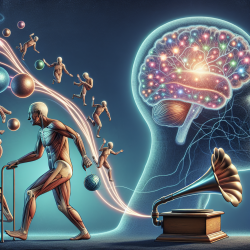Unlocking the Potential of Gait and Balance in Neurodegenerative Disorders
As practitioners dedicated to improving the lives of children, we often seek innovative approaches to enhance our therapeutic interventions. The Ontario Neurodegenerative Research Initiative (ONDRI) offers valuable insights into the intricate relationship between motor and cognitive functions in neurodegenerative disorders. This research provides a framework for understanding how gait and balance assessments can be pivotal in predicting and managing cognitive decline, ultimately leading to better outcomes for our young patients.
The ONDRI Study: A Comprehensive Approach
The ONDRI study is a longitudinal cohort study that investigates motor-cognitive profiles across five neurodegenerative diseases: Alzheimer's disease, frontotemporal degeneration, vascular cognitive impairment, amyotrophic lateral sclerosis, and Parkinson's disease. By employing a dual-task paradigm, where participants perform cognitive tasks while walking, the study aims to dissect the cognitive and motor contributions to mobility and cognitive decline.
Key Findings and Implications
The study highlights several critical findings:
- Gait and balance impairments are prevalent across all neurodegenerative disorders studied, indicating common underlying mechanisms.
- Dual-task gait assessments can reveal cognitive deficits that may not be apparent during single-task conditions.
- Identifying motor-cognitive profiles can aid in predicting disease progression and fall risk, providing a basis for targeted interventions.
For practitioners, these findings underscore the importance of incorporating gait and balance assessments into routine evaluations. By doing so, we can better identify at-risk children and tailor interventions to address both motor and cognitive challenges.
Moving Forward: Practical Applications
Integrating the ONDRI study's insights into practice involves several steps:
- Implement Dual-Task Assessments: Incorporate dual-task paradigms in therapy sessions to evaluate cognitive and motor interactions. This approach can help identify specific areas of difficulty and inform targeted interventions.
- Focus on Gait Variability: Pay attention to gait variability as a marker of cognitive decline. High variability may indicate underlying cognitive challenges that require further exploration.
- Educate Families: Share findings with families to enhance their understanding of the interconnectedness of motor and cognitive functions. This knowledge can empower them to support their child's development more effectively.
Encouraging Further Research
The ONDRI study opens the door to numerous research opportunities. Practitioners are encouraged to delve deeper into the motor-cognitive relationship, exploring how these insights can be applied to other populations, including children with developmental disorders. By contributing to this growing body of knowledge, we can continue to improve therapeutic outcomes and enhance the quality of life for those we serve.
To read the original research paper, please follow this link: Motor Phenotype in Neurodegenerative Disorders: Gait and Balance Platform Study Design Protocol for the Ontario Neurodegenerative Research Initiative (ONDRI).










